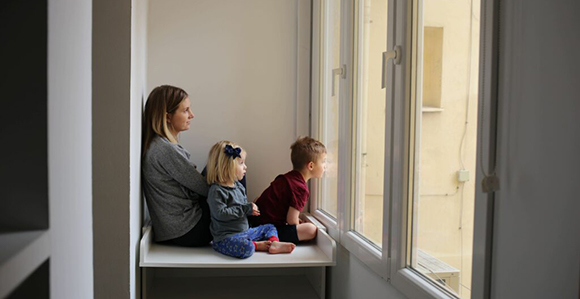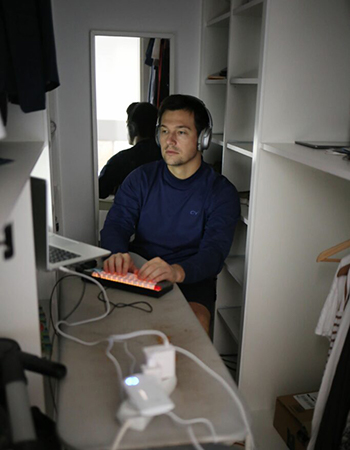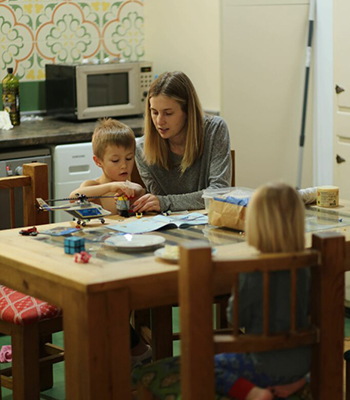One Family’s Story of Coping with Isolation amid COVID-19 Restrictions in Spain
Contributed By Aubrey Eyre, Church News reporter

Audrey Hunter looks out the window with her children while under lockdown at their apartment in Madrid, Spain, during the 2020 COVID-19 pandemic. Photo by CJ Hunter.
Article Highlights
- Take time for gospel study.
- Talk about the emotions you experience.
- Connect with your family.
"We’re trusting in the process and in the Lord." —CJ Hunter, student
Related Links
When Audrey Hunter’s four-year-old son, Robbie, woke with a cough and a fever on March 10, she did what she thought was best. Having learned that some of her husband’s business school classmates had been in close contact with someone who was a confirmed case of COVID-19, she decided to self-isolate their family in their Madrid, Spain, apartment.
Looking back, Audrey Hunter said she is glad they started isolating when they did. “If it’s as contagious as they say it is, we probably had it,” she said. She just wishes she and her husband, CJ, had known then just how long their isolation would last.
Just six days after the Hunters decided to isolate their family, Spain went under a total lockdown—meaning only one adult was allowed out at a time and only for essential things, like groceries and the pharmacy. Unless absolutely necessary, like visiting the hospital or doctor’s office, children were not allowed outside. As expats from the United States, the Hunters were already somewhat isolated from their families, but March 10 marked the beginning of 46 days of true isolation for their two children.
With different social-distancing and lockdown restrictions in nearly every location around the world, one’s isolation situation is often out of his or her control. But even when the power to change one’s circumstances is fairly low, there are also things that can be controlled in positive ways, said Alane Watkins, a licensed mental health counselor with Family Services.
One tool Watkins often uses to help her clients cope with difficult circumstances is a “T-Chart.” On one side, they list things they can’t change or control about their situation, and on the other side they list the things they can change or control.
“When we make that, it’s pretty obvious, fairly quickly, how much energy we often spend on things we cannot change,” Watkins said. The key, she explained, is to help people try to focus their energy on the components they have control over.
“Sometimes the only thing you can change is just your attitude about something,” she said. “But that can make a big difference.”
In most isolation situations right now, people can control their food choices, making sure they get a healthy and balanced diet rather than binging on things that will make them feel worse. They can also get a good night’s rest, find a way to get some exercise, and do other small things that help keep the body in a healthy state. A person’s physical and emotional state has a lot to do with mental health, Watkins said.
Another aspect of finding control is focusing on the positive. “The things I choose to focus on will have a stronger influence on how I feel,” Watkins said. But choosing those positive things isn’t always easy.
Finding Interior Blessings
With two children, both under the age of five, being stuck inside can be exhausting and frustrating, because the kids have no real way to release their energy, Audrey Hunter said, explaining how they have spent much of their time in isolation.
“One difficult aspect is that we are in an interior apartment. We’re surrounded by apartment buildings, so we have no view of the street or trees, and so that is hard. It has made me feel further isolated, because we have no idea what is going on outside most of the time,” she said.

Emma and Robbie Hunter play on an air mattress in their apartment in Madrid, Spain. The Hunter children spent 46 days in lockdown during the 2020 COVID-19 pandemic. Photo by Audrey Hunter.
Unable to do their normal stress-relieving activities, like going for a walk or getting outside to spend some time with friends at the park, there has been no real time to decompress, Audrey Hunter explained.
“I’ve noticed my emotions come in waves. Some days I feel like I can do it, I can deal with it, and the next day feels like I can’t make it through the afternoon. . . . The worst part for me is that it feels like Groundhog Day. There’s no differentiation. It’s like we’re living the same day over and over, and that’s been really difficult.”
She continued, “Our screen time has gone way up, but the kids are resilient and creative. It’s been fun to see what they come up with when they’re bored. They will ride bikes around in our main room, and CJ comes up with fun stuff like blowing up an air mattress for them to bounce on.”

CJ Hunter works at his makeshift desk in his closet while under lockdown in Madrid, Spain, during the 2020 COVID-19 pandemic. Photo by Audrey Hunter.
In order to continue his school work, CJ Hunter has created a small workspace in their closet so he can escape from the kids for a few hours each day and do his school work.
And although it’s not much of a view, sometimes, during those 46 days, looking out of their window at the stone and brick surrounding them has offered a little bit of solace and peace in their situation.
Almost every time either Audrey or CJ Hunter has left the apartment in the last two months, their short respites into the outside world haven’t provided much relief from the confinement of their apartment.
The streets are being patrolled by police and military. People are being stopped and questioned about why they are out, Audrey Hunter said, noting how grateful she is they have never been stopped and questioned.
Living in Spain while CJ Hunter studies for an MBA from an international English-speaking program, the Hunters don’t speak much Spanish.
“The kids speak more than we do,” CJ Hunter said. So both he and his wife are glad they haven’t had to deal with explaining themselves to the authorities while out getting groceries or other things.
“People ask us why we don’t go to the grocery store farthest away,” Audrey Hunter said. “But we are worried about getting a fine or not being able to explain ourselves, so we stick to the one across the street from our apartment.”
While being in a foreign country during this pandemic, far from family and their normal support system, has been difficult to cope with at times, the Hunters said they have found strength and support from their Church community and blessings from the extra time they have spent together.
Isolation regulations are different everywhere, CJ Hunter said. “Ours are more restricting, but at the same time we’ve been blessed as a family. This time together has drawn us closer.” And although he wouldn’t wish 46 days stuck inside on anyone, he said it is clear that the Lord has been looking out for them.

Audrey Hunter helps her children with their toys while staying inside during lockdown at their apartment in Madrid, Spain, during the 2020 COVID-19 pandemic. Photo by CJ Hunter.
“I haven’t been able to spend this much time with my kids ever,” CJ Hunter said. “It’s been fun just watching them play or watching a movie with them and just being able to appreciate this quality time together.”
Audrey Hunter’s been most grateful for the support system of the Church. A family in their ward, the Zapata family, has been a huge help in keeping them updated on the restrictions and adjustments happening in the country, she said.
“They have helped us adjust with the pandemic, and they always explain things and keep us updated on news. We would be more than a few steps behind without them,” she said.
The Hunters also maintain a bit of sanity by doing FaceTime with family in the United States.
But at the end of the day, Audrey Hunter said being able to do Come, Follow Me and study the gospel so independently provides an “underlying sense of peace that we are being watched over and that we are where we’re supposed to be.”
Day by Day and Step by Step
For those who are struggling with isolation, sometimes just a connection or validation of the difficulty of their situation and their feelings will help ease some of the pressures they are feeling, Watkins explained. By accepting and acknowledging what is going on, it becomes easier to find ways to cope with it. And that has proved true for the Hunters so far.
Being trapped inside all together as a family is hard because they can’t do the things they normally would to relieve stress or take time for themselves, Audrey Hunter said.
“We try to take things day by day. We try hard not to think too much about the future, because we don’t know what is going to happen, and it makes me feel anxious,” she said. “It’s still pretty hard, but we’ve resigned ourselves to the reality of it. We’re looking more towards being hopeful, and we’re just ready to go with it. ”
At first, they were constantly trying to strategize ways to escape and get out of the city, CJ Hunter said. “Now we’ve just kind of accepted it, though, and we’re trusting in the process and in the Lord.”

Robbie Hunter rides his bike in an open square near his family’s apartment in Madrid, Spain, on Sunday, April 26. The excursion marked the first time in 46 days that he was able to go outside during the 2020 COVID-19 pandemic. Photo by Audrey Hunter.
For those stuck in isolated situations, creating and maintaining good lines of communication is also essential, Watkins said. “You shouldn’t be harboring things. It’s better to sit down and address problems—just talk about what is going on and why it is difficult.”
One of the chronic problems Watkins sees the most is avoidance. “We avoid feelings and emotions and often have a lack of awareness of what is happening internally. A lot of times, we’re not really good at identifying what we’re feeling and why we’re feeling it. That’s a skill that takes time, and not everyone is motivated to do that.”
One of the benefits of being stuck in isolation, though, is that in some ways it forces individuals to deal with how they are feeling and find ways to express it.
“As a mom,” Audrey Hunter said, “I’ve felt a lot of guilt about how much our screen time has increased and that our kids are not going out. But I have had to learn that this is a short season and it’s OK to let go of things right now and just make it through. I really try to focus on checking in with myself and stating how I am feeling, telling CJ how I feel—that’s another important thing.”
Balancing Uncertainty and Hope
Although isolation and even social distancing can be a difficult adjustment, Watkins said that for the most part “people are pretty resilient and seem to be doing a pretty good job of dealing with it.”
Near New Bedford, Massachusetts, Telma Soares and her husband, Alecio, and their two children have also been trying to find a balance between keeping isolated and going about normal life.
“It’s hard to live in an apartment and not be able to have a yard,” Soares said. “But we still have some outside walks every now and then.”
Even though they are not under strict lockdown to stay home, isolating from others has taken its toll on her family, Soares explained.

Emma Hunter rides her scooter in an open square near her family’s apartment in Madrid, Spain, on Sunday, April 26. The excursion marked the first time in 46 days that she was able to go outside during the 2020 COVID-19 pandemic. Photo by Audrey Hunter.
“It’s crazy not knowing when it will end,” she said. “The uncertainty of tomorrow makes me anxious. What helps me cope the most is reading my scriptures. I also meditate very often. We love playing family games and watching our favorite movies. We also Zoom with friends occasionally.”
The difficult thing about isolation is that it exacerbates issues that already exist. “Isolation cuts off our resources,” Watkins said. “Connection is a basic human need; we all need that, and it can be difficult in isolation.”
By focusing on what one can control or change and finding the positive aspects of those things, isolation can become more manageable, even for those having a difficult time with it, Watkins explained.
And sometimes the things one can’t control but can hope for can end up being worth the wait.
On Sunday, April 26, regulations restricting children in Spain from going outside were amended to allow for one adult with three children at most to go out each day for one hour, within one kilometer of their homes. Children are also being permitted to take a bike, a scooter, or a ball on their short outings each day.
For Audrey Hunter, the change in lockdown restrictions came as a huge relief and blessing after 46 days.
“Our kids were frantic as we were all getting dressed, because they were so excited,” she said. “Being able to go outside with our kids, even separately and just for an hour, felt like a big light at the end of the tunnel for us.”

The Hunter family. Photo courtesy of Audrey Hunter.
